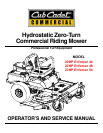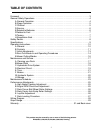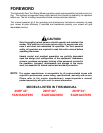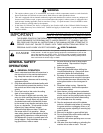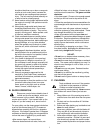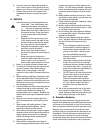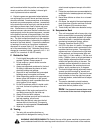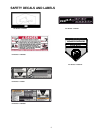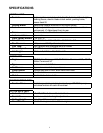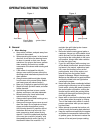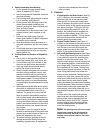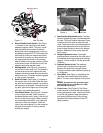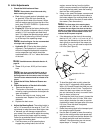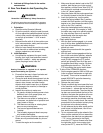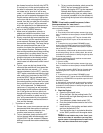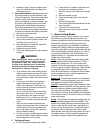
6
6. Use extra care when approaching blind cor-
ners, shrubs, trees or other objects that may
obscure your vision of a child or other hazard.
7. Remove the key when the machine is left
unattended to prevent unauthorized opera-
tion.
D. SERVICE
1. Use extreme care in handling gasoline and
other fuels. They are extremely flam-
mable and the vapors are explosive.
a. Use only an approved container.
b. Never remove fuel cap or add fuel with
the engine running. Allow the engine
to cool at least two minutes before
refueling.
c. Replace the fuel cap securely (it will
“click” when correct) and wipe off any
spilled fuel before starting the engine
as it may cause a fire or explosion.
d. Extinguish all cigarettes, cigars, pipes
and other sources of ignition.
e. Never refuel the machine indoors
because fuel vapors will accumulate in
the area.
f. Never store the fuel container or
machine inside where there is an open
flame or spark, such as a gas hot
water heater, space heater or furnace.
2. Never run a machine inside a closed area.
3. To reduce fire hazard, keep the machine free
of grass, leaves or other debris build-up.
Clean up oil or fuel spillage. Allow the
machine to cool at least 5 minutes before stor-
ing.
4. Before cleaning, repairing or inspecting, make
certain the blade and all moving parts have
stopped. Disconnect the spark plug wire, and
keep the wire away from the spark plug to pre-
vent accidental starting.
5. Check the blade and engine mounting bolts at
frequent intervals for proper tightness. Also
visually inspect blades for damage (e.g.,
excessive wear, bent, cracked). Replace with
blades which meet original equipment specifi-
cations.
6. Keep all nuts, bolts and screws tight to be
sure the equipment is in safe working condi-
tion.
7. Never tamper with safety devices. Check
their proper operation regularly. Use all
guards as instructed in this manual.
8. After striking a foreign object, stop the engine,
remove the wire from the spark plug and thor-
oughly inspect the mower for any damage.
Repair the damage before restarting and
operating the machine.
9. Grass catcher components are subject to
wear, damage and deterioration, which could
expose moving parts or allow objects to be
thrown. For your safety protection, frequently
check the components and replace with man-
ufacturers recommended parts when neces-
sary.
10. Mower blades are sharp and can cut. Wrap
the blades or wear gloves, and use extra cau-
tion when servicing blades.
11. Check park brake operation frequently. Adjust
and service as required.
12. Muffler, engine and belt guards become hot
during operation and can cause a burn. Allow
to cool down before touching.
13. Do not change the engine governor settings
or overspeed the engine. Excessive engine
speeds are dangerous.
14. Observe proper disposal laws and regula-
tions. Improper disposal of fluids and materi-
als can harm the environment and the
ecology.
a. Prior to disposal, contact your local
Environmental Protection Agency to
determine the proper method for dis-
posing of the waste. Recycling cen-
ters are established to properly
dispose of materials in an environmen-
tally safe fashion.
b. Use proper containers when draining
fluids. Do not use food or beverage
containers that may mislead someone
into drinking from them. Properly dis-
pose of the containers immediately fol-
lowing the draining of fluids.
c. DO NOT pour oil or other fluids into the
ground, down drain or into a stream,
pond, lake or other body of water.
Observe Environmental Protection
Agency regulations when disposing of
oil, fuel, coolant, brake fluid, filters,
batteries, tires and other harmful
waste.
15. We do not recommend the use of high pres-
sure washers to clean your unit. They may
cause damage to electrical components; spin-
dles; pulleys; bearings; or the engine.
E. Related to Batteries
Batteries are stored electrical energy devices that
may be serviceable with removable caps (the electro-
lyte levels can be checked), or may be non-service-
able (no attempt should be made to open the vents).
Batteries may contain lead (Pb) and sulfuric acid,
and they must be re-cycled and not disposed of nor
abandoned. Sulfuric acid can cause severe burns,
and in the event of contact, the areas should be
flushed with water and a physician contacted. Battery
cases should not be punctured. Lead is poisonous



